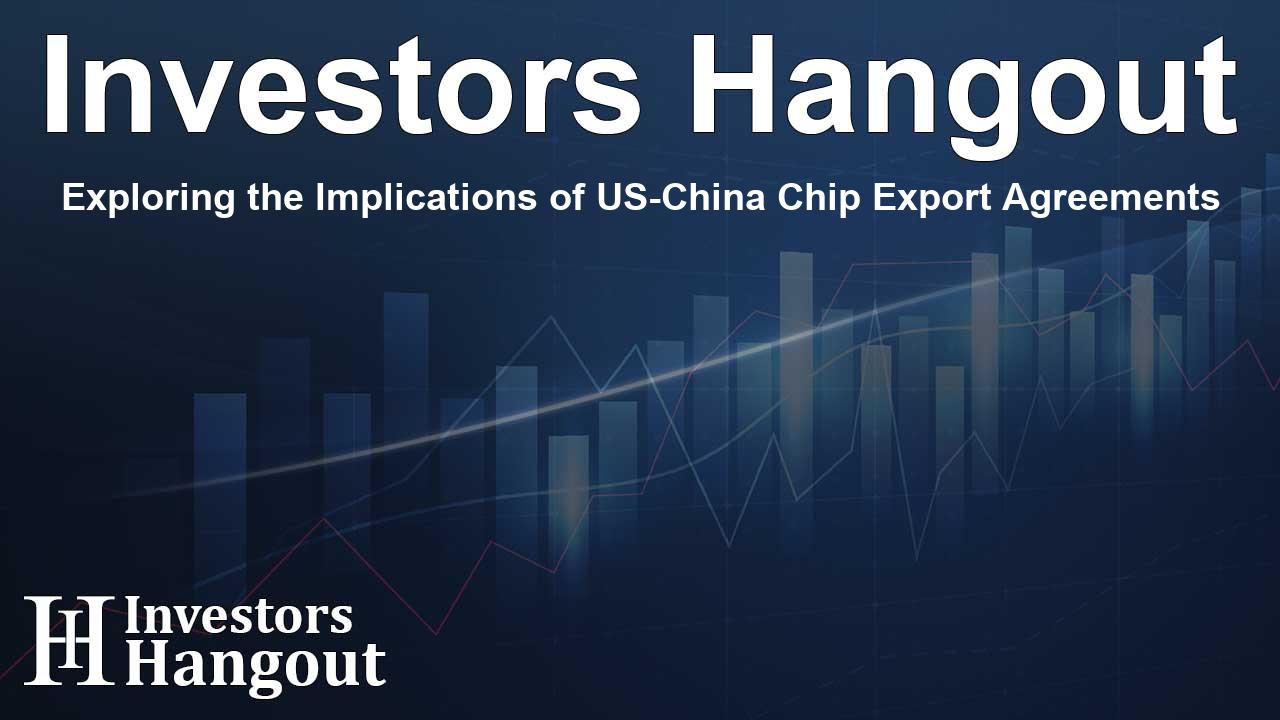Exploring the Implications of US-China Chip Export Agreements

Understanding the Recent Developments in Chip Exports
The recent agreement between two leading semiconductor manufacturers, Nvidia (NASDAQ: NVDA) and AMD (NASDAQ: AMD), alongside the US government, represents a pivotal change in trade policy dynamics. Under this deal, both companies will contribute 15% of their revenues from China-based AI chip sales to acquire necessary export licenses.
This agreement is particularly noteworthy as it pertains to Nvidia’s H20 and AMD’s MI308 chips, which were tailored specifically for the Chinese market following prior restrictions. Such a strategy risks redefining export controls as mere financial transactions rather than essential national security measures.
Unpacking the Impact of the Agreement
Historically, the monetization of access to export licenses is unprecedented in the United States. Following a significant meeting between Nvidia's CEO Jensen Huang and a notable political figure, the Department of Commerce reacted quickly, issuing licenses just days after the discussions.
At first glance, this may seem like a practical approach. American companies would retain their sales channels, the government would receive substantial financial benefits, and China would gain access to advanced technology. However, this presents a dangerous precedent that could destabilize the global trade landscape.
The Financial Stakes for Nvidia and AMD
Nvidia's potential sales in China could reach 1.5 million units of the H20 chip by 2025, projecting revenues of approximately $23 billion. Similarly, AMD sees significant opportunity in China, where a quarter of its total revenue was generated in the previous year.
While the 15% taxation on AI chip sales could funnel massive sums to the US treasury, this proposed measure undercounts the wider implications associated with transforming export controls into revenue-sharing agreements.
The Risks of Financializing Export Controls
Export policies are should be firmly anchored in consistent technical guidelines aimed at safeguarding national security. Transitioning these controls into financial transactions alters their essential purpose.
As these agreements morph into bargaining mechanisms, they introduce instability into international markets and compromise the trust established between trading partners. This deal is potentially not an isolated occurrence; it could set the stage for similar strategies across the globe. Other nations may find themselves influenced by the US model, leading to trade agreements relying more on financial incentives than on established regulations.
Historical Context and Future Implications
The recent policy adjustments stem from earlier bans imposed on Nvidia's H20, exemplifying a fluctuating political landscape. Critics within the security sector express concerns that these technologies could inadvertently bolster Chinese military capabilities. Conversely, proponents argue that the arrangement keeps US firms competitive and generates essential funding for national interests.
However, the mingling of commercial and national security ambitions jeopardizes the integrity of trade policies. When market dynamics are negotiable for financial gain, both domestic and international stakeholders begin to lose confidence in the stability of trade commitments.
Navigating Future Trade Policies
As this approach gains traction, we could witness substantial shifts within global supply chains, leading to unpredictable market conditions. Companies might face escalated costs and be compelled to establish costly redundancies, along with potentially hastening research and development transfers outside of the United States.
The cornerstone of investor confidence lies in predictability, which is threatened when regulatory actions are swayed by financial considerations. This transactional approach could compel businesses to diversify their supply chains and limit their exposure to US regulations.
Conclusion: The Future of Global Trade
Businesses require certainty to flourish—not the uncertainty that arises when trade regulations become a commodity. As the global community grapples with these challenges, it becomes crucial to uphold a transparent, rules-based trading system promoting trust and stability.
Ultimately, the implications of these recent agreements reach far beyond semiconductors or specific national policies; they impact the overarching framework of global trade and cooperation.
Frequently Asked Questions
What is the significance of the Nvidia and AMD agreement?
This agreement allows these companies to sell their chips in China while also directing a portion of their revenues to the US government, which has broader implications for trade policy.
How does this impact global markets?
This arrangement might destabilize market dynamics and introduce unpredictability in international trade, potentially eroding trust among trading partners.
What are the financial implications for Nvidia and AMD?
Nvidia and AMD could generate significant revenue from China, but this relationship with the US government adds new complexities to their financial outlooks.
Are there concerns regarding national security?
Yes, some experts are wary that these chips could enhance China's AI capabilities, which could indirectly benefit its military pursuits.
What does this mean for the future of US trade policy?
If this financialization of export permits continues, it may lead to erratic regulations and increased political risks, affecting long-term trade relationships.
About The Author
Contact Henry Turner privately here. Or send an email with ATTN: Henry Turner as the subject to contact@investorshangout.com.
About Investors Hangout
Investors Hangout is a leading online stock forum for financial discussion and learning, offering a wide range of free tools and resources. It draws in traders of all levels, who exchange market knowledge, investigate trading tactics, and keep an eye on industry developments in real time. Featuring financial articles, stock message boards, quotes, charts, company profiles, and live news updates. Through cooperative learning and a wealth of informational resources, it helps users from novices creating their first portfolios to experts honing their techniques. Join Investors Hangout today: https://investorshangout.com/
The content of this article is based on factual, publicly available information and does not represent legal, financial, or investment advice. Investors Hangout does not offer financial advice, and the author is not a licensed financial advisor. Consult a qualified advisor before making any financial or investment decisions based on this article. This article should not be considered advice to purchase, sell, or hold any securities or other investments. If any of the material provided here is inaccurate, please contact us for corrections.
